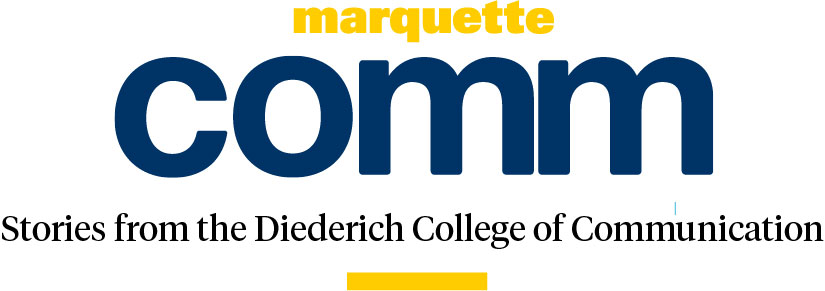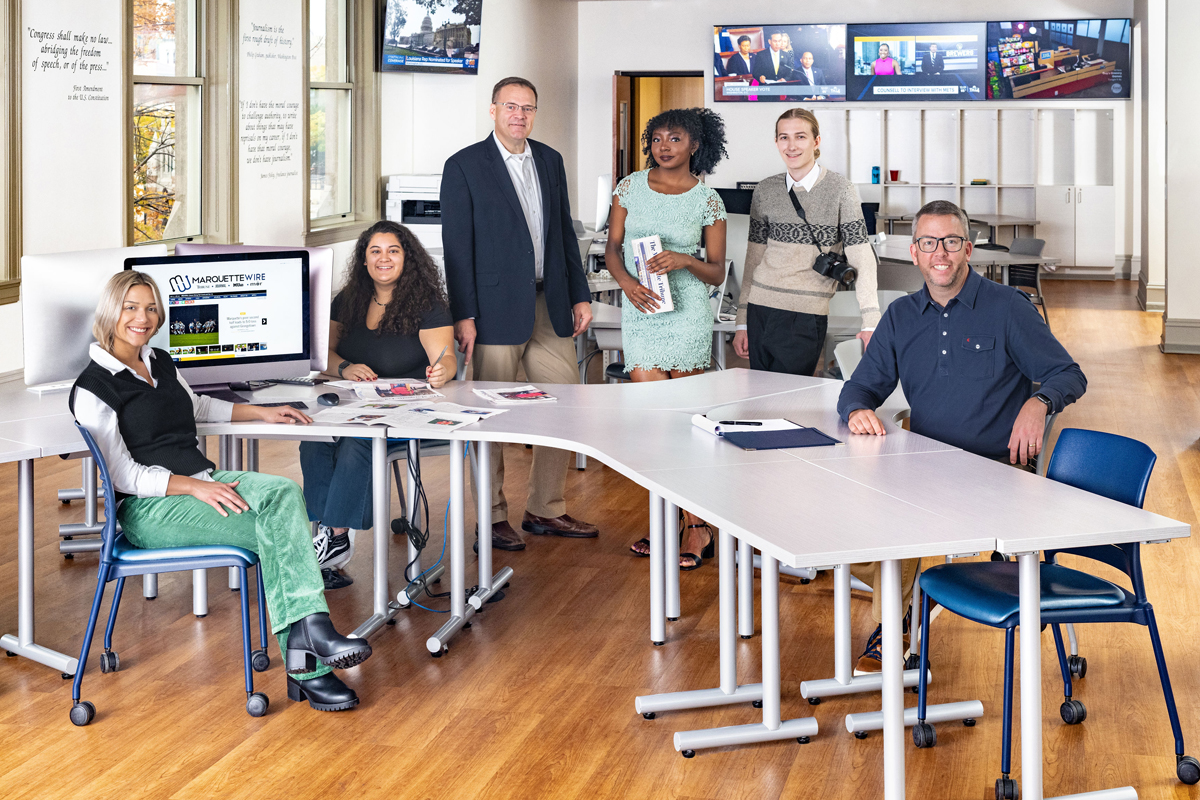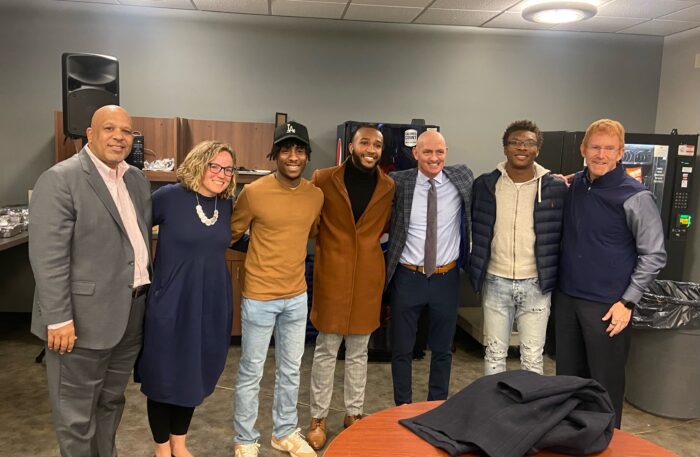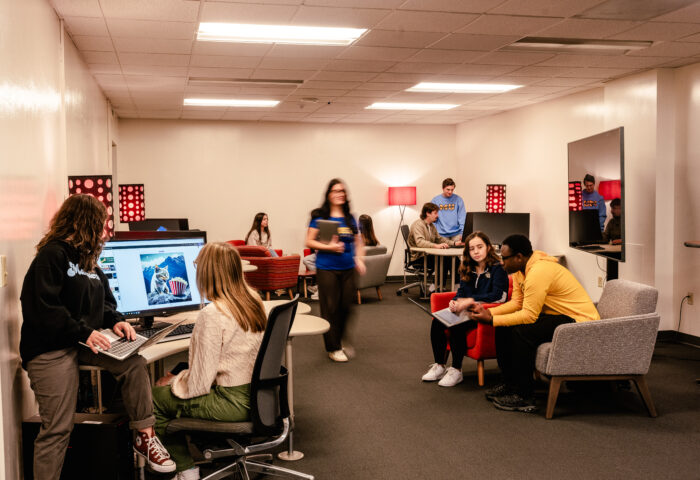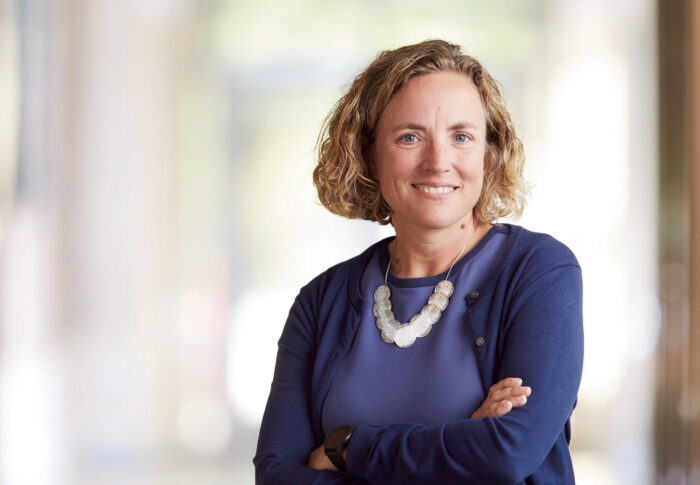It’s barely 10 a.m., but it already has been a busy morning for Tim Vetscher, news director of WTMJ-TV in Milwaukee.
He awoke to the news that U.S. Sen. Diane Feinstein had died overnight in Washington, D.C., and he started the workday by meeting with his staff to discuss how to cover the story locally. Amid many emails, phone calls and texts dealing with that and other breaking news, Vetscher, Comm ’98, carved out time for an interview about his recent appointment to the Marquette University Board for Student Media, and even showed off photos on his phone of Andrew Amouzou, Comm ’23, reporting from a Green Bay Packers game the night before for NBC26 in Green Bay.
“They feel like my own kids, in a way,” he says of the former students he has counseled, including Amouzou, whom Vetscher got to know when the former was executive director of the Marquette Wire and general manager of MUTV.
For Vetscher, joining the board is the culmination of years of support for broadcast journalism students at Marquette: mentoring, advising and critiquing their work starting not long after his own graduation.
For a fellow journalism leader, Milwaukee Journal Sentinel Executive Editor Greg Borowski, CJPA ’89, it’s a similar story. He has been helping students since he was one almost 35 years ago.
“Greg always had the vision of doing what was best for journalism at Marquette.’’
Patrick Thomas, reporter with The Wall Street Journal
Devoted to their families, with demanding jobs as prominent newsroom chiefs and decision makers that don’t end when they leave the office, the two still always find time to take a call or answer an email from a Marquette connection. And their commitment to the Diederich College of Communication positively influences current and former students, as well as faculty.
“The two have been invaluable in providing guidance and support,’’ reports Patrick Johnson, director of student media.
After his graduation, Borowski made himself available to students while working in Indiana and Michigan and continued to consult, mentor and even teach once he returned to his hometown of Milwaukee in 1998. He joined the Board for Student Media in 2005.
In 2013, he helped shepherd the formation of the Perry and Alicia O’Brien Fellowship in Public Service Journalism that pairs professional journalists with Marquette communication students for nine-month projects. (One spot is reserved for the Journal Sentinel every year.) Peter and Patricia Frechette donated $8.3 million in honor of Patricia’s parents, Marquette alumni Perry and Alicia O’Brien, to launch the fellowship with the college and the Journal Sentinel. The Frechette family added a $5 million sustaining gift in 2021.
Borowski is a member of the program’s board/selection committee and has personally edited all the projects that appear in the Journal Sentinel, as well as some that appear in other publications.
In 2014, he was instrumental in modernizing and reorganizing student media into The Wire. In a transition that mirrored what professional journalists were navigating — including those in the Journal Sentinel newsroom — Borowski helped Marquette students understand and accept that breaking down the existing silos of The Marquette Tribune, Marquette Journal, MUTV, Marquette Radio and the advertising department to achieve convergence, as The Wire would benefit everyone in the long run.
“Greg did help save student media multiple times over,’’ says Patrick Thomas, Comm ’18, a reporter with The Wall Street Journal and a former Journal Sentinel intern. “Greg always had the vision of doing what was best for journalism at Marquette.’’
Borowski decided to go into journalism after experiencing the power of the profession up close. When he was a junior at Messmer High School, an integrated Catholic school on the city’s north side, the Archdiocese of Milwaukee announced it was closing the school. A group of parents, including Borowski’s, rallied to save it.
“My batteries get recharged when I go back to campus and see how enthusiastic the kids are about journalism and going into the industry. They give me hope for the future.’’
Tim Vetscher, news director of TMJ4
“At every step of the way, reporters covered the story and gave voice to students and parents who were fighting against long odds and what seemed like an insurmountable battle,’’ Borowski says. “None of the reporters were advocates. But they were truth tellers and willing to amplify voices that might have gone unheard.
“That was a formative experience for someone considering journalism as a career.’’
A former newspaper carrier for the Sentinel, he got his dream job when he was hired to cover City Hall for the Journal Sentinel in 1998. He worked his way into editing, and as senior editor for projects and investigations, he directed his team to Pulitzer Prizes in 2010 and 2011. After stints as deputy managing editor and deputy editor, he took over as executive editor in 2023.
“He’s really a great editor, one of the best in the country at what he does,’’ says Dave Umhoefer, a former Journal Sentinel reporter who won a Pulitzer Prize for local reporting in 2008 and is now director of the O’Brien Fellowship program. “He’s super supportive, but he also has incredibly high standards that he needs and expects you to meet.
“A good editor can make or break a reporter’s career. He had the best interests of the team and the whole paper in mind. There was mutual loyalty there. I felt like I would run through a wall for him. He was not a guy who just showed up and put a bunch of red lines through a story.’’
Many former and current student journalists who have connected with Borowski feel a similar sense of respect and gratitude toward him. “He’s literally been a reference for every job I’ve ever gotten,’’ says McKenna Oxenden, Comm ’18, a former O’Brien student assistant and Journal Sentinel intern who just started a job with the Houston Landing, a nonprofit digital platform. “I don’t think he’s ever told me no when I asked for help.’’
Vetscher’s involvement with his alma mater has been shorter, but no less intense.
He had wanted to be a journalist since he was a child going to work with his mom, a nurse at the Star Tribune in Minneapolis. When he got to Marquette, a combination of broadcast journalism and Jesuit-influenced classroom experiences proved transformative. “I learned how to write, I learned how to ask good questions, and I learned how to think. I credit my professors at Marquette for teaching me those things. In my opinion, no school in America teaches those fundamentals better than Marquette.”
After graduating from Marquette, he maintained connections with the college while working in markets all over the country. Jeff Kiernan, Jour ’87, a mentor from Vetscher’s college days, hired him as editorial director at TMJ4 in 2019. Before Kiernan left in 2021, he took Vetscher to Johnston Hall to watch and critique a student broadcast on a Wednesday night, and Vetscher has been going on Wednesdays ever since.
“I remember students gravitating to Tim because of his knowledge — and his position,” Amouzou says. “But it wasn’t just that. It was his energy. He is the epitome of a Marquette alum — not only the passion, not only the giving back, but also being open to really helping students.’’
Today, Vetscher returns the favor of the alumni who hired him by recruiting recent Marquette graduates to TMJ4 — such as Kaylee Staral, Comm ’22. “I know I’m biased, but for my money, it’s one of the best student programs in the country,” he says. “I’m continually impressed by the work they do. My batteries get recharged when I go back to campus and see how enthusiastic the kids are about journalism and going into the industry. They give me hope for the future, and I come back to work reinvigorated.’’
